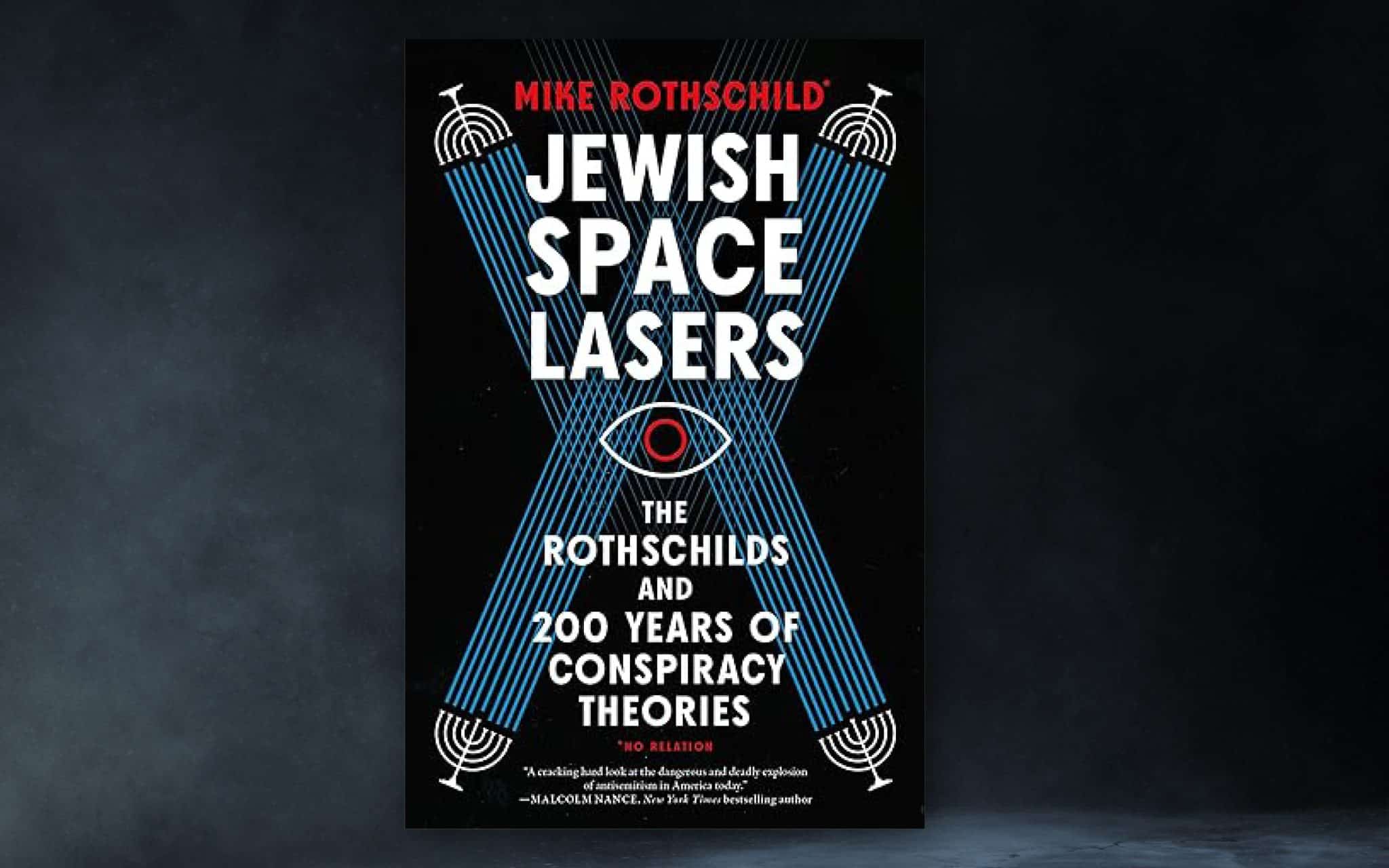Jewish Space Lasers: The Rothschilds and 200 Years of Conspiracy Theories has a whimsical title, but covers a deadly serious topic – antisemitism. The actual term originated from a 2018 Facebook post by Marjorie Taylor Greene before she ran for Congress.
According to her tortured reasoning, “lasers or blue space beams” fired by a “space-based solar generator” operated by Pacific Gas & Electric (PG&E) had caused widespread fires in an area of rural California designated for a $77 billion light rail project managed by the husband of Senator Diane Feinstein. (235-236) Greene, in the classic “just asking questions” mode familiar to conspiracy believers, sarcastically wrote:
“If they are beaming the suns [sic] energy back to Earth, I’m sure they wouldn’t ever miss a transmitter receiving station right??!! I mean mistakes are never made when anything new is invented. What would that look like anyway? A laser beam or light beam coming down to Earth I guess. Could that cause a fire? Hmmm, i don’t know. I hope not! That wouldn’t look so good for PG&E, Rothschild Inc., Solarin [a green energy company) or Jerry Brown who sure does seem fond of PG&E.”
Although Greene never used the phrase “Jewish Space Laser” and the post was removed from Facebook for violating its policies, a cottage industry of ridicule quickly appeared online.
Histories of the Rothschild family and its alleged links to a potpourri of global conspiracies are not rare. A cottage industry of pamphlets, handbills, books, plays, films, and even a few musicals have followed them for almost two centuries. Legitimate scholarship, such as Mike Rothschild’s (no relation) expansive study, is a different story.
The book’s purpose is relatively simple. It provides the origin story of one of Europe’s wealthiest and most influential families, an often-tenuous alliance of blood relatives on par with 19th Century American peers like J.P. Morgan or John D. Rockefeller. The Rothschilds were (and are) heroes to Jews (192), not just because of their economic success but also, and perhaps more importantly, because of their perseverance. (195)
What they persevered against was an evolving and constantly expanding thicket of accusations, paranoid speculation, and outright persecution that grew up around the Rothschilds even as their actual relevance in modern politics and finance began to fade. The family remains embedded in European affairs – French president Emmanuel Macron was denounced as “Rothschild’s choice” as late as 2019 (232) — as well as the current American political landscape through conspiracists as diverse as Jesse “The Body” Ventura, Pat Robertson, and Glenn Beck. Understanding the history of the Rothschilds and conspiracy theory is an exercise in both history and contemporary events.
READ: Antisemitism Is a Threat to Us All — And to Democracy
The book delves into a variety of general Jewish tropes applied to the Rothschilds. They represent the prototypical “Greedy Jew.” (7-11). Because so many European leaders and governments valued their banking acumen, the Rothschilds also fell under the category of the “Jew as Financial Soothsayer.” (11-16) However, at the same time, even as they were celebrated for their philanthropy and opulent lifestyles, critics often wielded the label “Cheap Jew.” (16-20)
The scapegoating took more specific forms. It was common to depict the Rothschilds as Jewish “royalty,” the “kings” of the Jewish people. (66-67) This implied an effective hierarchy able to exercise power and influence. The end result was to lay responsibility for a laundry list of real and imagined historical events at the Rothschilds’ feet. These included the “Waterloo canard” (1815) when the family manipulated news of the famous battle to enrich themselves in British financial markets. There was the Damascus Affair (1840) where Jews in Syria and the Rothschilds specifically were accused of orchestrating ritual murder. In 1846, the Fampoux railroad disaster triggered suspicions that the “Cheap Jew” had placed profit over passenger safety. (65)
A combination of factors gave these conspiracy beliefs traction. Antisemitism was an ongoing fact of life in Europe during the Rothschilds’ rise and still reaches every corner of the world today.
Historical context also played a part. The backlash against the European Industrial Revolution, “anti-capitalist populism,” frames much of the family’s story. (62) When intellectuals and the public in general attacked “financial feudalism,” it took them directly to one of the most important agents of change on the continent. (63) So did new technology, like the spreading network of railroads owned by the Rothschilds, that touched virtually every part of society. However, as it often happens, modern innovations improved life and also prompted a general sense of anxiety that comes with change.
Working in concert with the hard realities of history was the power of perception. Jewish Space Lasers returns to a point covered in many books about conspiracy belief:
“But like with conspiracy theories of today, the charge that Nathan [Rothschild] leveraged Waterloo for total domination didn’t need proof or testimony or citations. All it needed was a creative lie about a powerful figure that was told in an appealing way.” (67-68)
In the end, the driving force behind conspiracy belief is a combination of historical context, confirmation bias, and shameless promotion.
READ: The Important Legacies of the January 6th Conspiracy
The facts suffer throughout this process. To make this point, the author frequently traces events or statements attributed to the family, such as an alleged assertion by Mayer Rothschild in 1790:
“Give me control of a nation’s money supply, and I care not who makes its laws.” (181)
The quote appears in conspiracy promoter G. Edward Griffin’s The Creature from Jekyll Island (1994). Griffin, in turn attributes the passage to a speech made by Senator Robert L. Owen in 1939 with the caveat that:
“This quotation could not be verified in a primary reference work. However, when one considers the life and accomplishments of the elder Rothschild there can be little doubt that this sentiment was, in fact, his outlook and guiding principle.” (181)
This is how memes are born.
The relationship between America and the Rothschilds is filled with irony. The family avoided investing in the United States for years, dubious about their economic opportunities and (rightly) wary of powerful rivals. None of this stopped rumors from circulating:
“Antisemitism was taking hold in the United States to the point where the loathing of the Rothschilds far outstripped their actual impact in that country.” (88)
Even their limited ventures drew suspicion. “Somehow, in a country where the only limits on success were your own dreams, the Rothschilds had accomplished too much—and couldn’t be trusted because of it.” (103)
Rothschild conspiracies continue today because they are useful to the people promoting them. Unhappy that “the United States had the nerve to elect a Black president who was going to put you on a death panel for not buying health insurance”? (225) Worried about “white genocide”? (227) Looking for someone to blame for California wildfires? (235) Outraged at the “stolen” 2020 election? (243) In every case, whether we are talking about the Tea Party, QAnon, Marjorie Taylor Green, Alex Jones, or Donald Trump, invoking the Rothschilds is a useful tool that motivates and channels constituencies. If the Rothschild name does not resonate enough, rebranding the same old accusations against George Soros will do. (254-270)
READ: Understanding Why Christians Are Seduced by QAnon and Conspiracy Theories
Trump’s relationship with the Rothschilds adds a final layer of American irony to the story. As much as his politics rely upon various degrees of antisemitism, Trump enjoyed an actual financial relationship with the family. The New York-based Rothschild, Inc., and specifically Wilbur Ross, who later became Trump’s Secretary of the Commerce, were instrumental in saving the Trump Taj Mahal casino from bankruptcy in the nineties. (228) It is interesting that neither Ross, who was touted by Bloomberg Markets as one of the fifty most influential people in global finance, nor his relationship with Trump has prompted another wave of Rothschild conspiracy theories.
And yet, that outcome makes perfect sense.
Rothschild conspiracies have never relied on a rational process of logical deduction. They subsist on fear, hate, and compartmentalized, often contradictory thinking. This was true a century ago and it is true today.
Jewish Space Lasers is essential reading for anyone interested in unpacking the tragic history of antisemitism and one of its principal targets. More to the point, in the closing months of a presidential election, the book is a valuable tool for understanding what drives too much of our contemporary politics.







